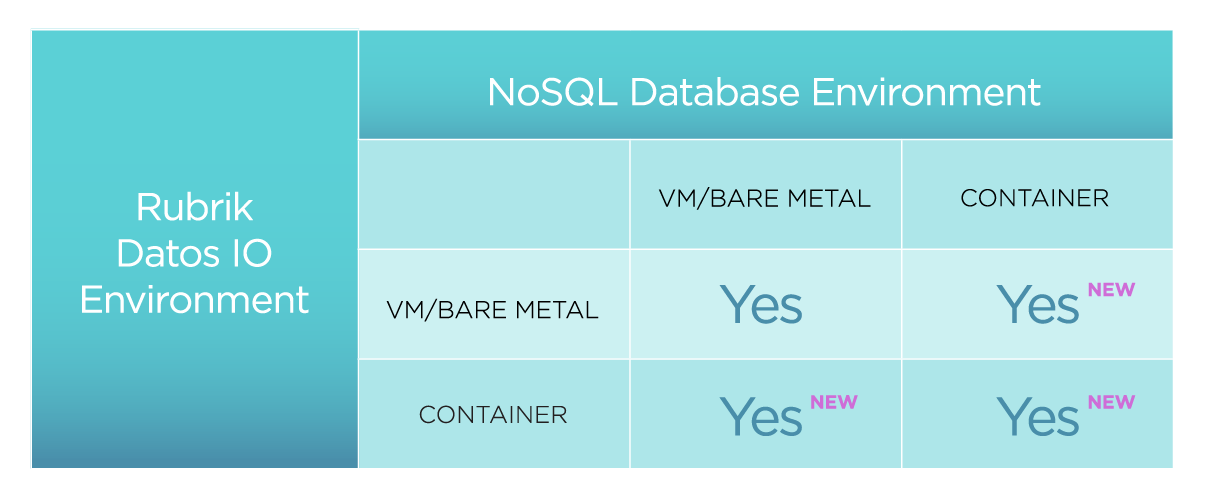Last month, we were thrilled to announce Rubrik Datos IO 3.0, the biggest Datos IO launch ever. The most exciting additions of this release include new support for NoSQL databases deployed on containers and the ability to deploy Datos IO natively as a Docker container. These capabilities enable enterprises that are adapting container-based architectures to pursue digital transformation and build out their multi-cloud strategies.
The Journey from Physical Servers to VMs to Containers
The technology around us is evolving rapidly. We started with building applications that run on servers (aka physical machines) and then gradually moved to VMs that allowed us to run multiple applications on a single physical machine. Though this helped optimize data center utilization, procuring and managing physical and virtual machines incurred time and operational costs. Cloud quickly become the solution that enabled faster time-to-market while achieving massive cost savings.
However, with so many infrastructure choices, precious developer time is often wasted in deciding the underlying infrastructure. Containers address this pain point by enabling developers to spend time building robust applications, leaving the choice of underlying infrastructure to IT.
Organizations are increasingly embracing this next wave to build containerized applications. With containers, they no longer have to worry about cloud vendor lock-ins and can still realize the benefits of the cloud. While the software developers focus on building applications as microservices that run inside containers, DBAs and IT operations teams can focus on choosing the infrastructure, security, and data protection strategies. Likewise, the SysOps teams can focus on deploying and managing these containers. Because containerized applications are infrastructure agnostic and offer seamless portability for applications and data, IT teams can even choose a hybrid cloud or multi-cloud architecture. It’s a win-win-win.
Data Protection for Containerized Applications
Modern-day applications no longer rely on traditional relational databases. They are now built on highly-scalable, vendor-agnostic, non-relational NoSQL databases such as MongoDB, Cassandra, and Amazon DynamoDB. These NoSQL databases provide the much-needed elasticity for growing businesses while containers provide a strong foundational technology to support elastic distributed applications.
Many modern enterprises are choosing to build cloud-native containerized applications on top of NoSQL databases that also run inside containers. The latest release of Rubrik Datos IO was designed for these enterprises. New capabilities for containerized environments include:
- Scalable backup and recovery for NoSQL databases such as MongoDB and Cassandra deployed as Docker containers.
- Scale-out Rubrik Datos IO data management software running as Docker containers.

The Nuts and Bolts of Container Support in Datos IO
Our approach with Datos IO 3.0 ensures both operational simplicity and ultimate flexibility. Docker allows multiple containerized applications to run on the same physical or virtual machine. An orchestration layer (i.e. Kubernetes, Swarm, Mesos, Rancher) is used to manage the container operations, which ensures that inter-application communication is not affected by the container deployment topology. This is done using a technique called port mapping.
Datos 3.0 supports port mapping for containers. For example, suppose a single server is running two containers. To enable SSH-based application communication, these containers are configured to map to different server ports. For instance, say port 22 of the first container is mapped to server port 1111, and port 22 of the second container is mapped to server port 1112. Containerized Datos IO application supports the ability to specify custom ports to communicate with the database containers. Datos IO can also directly communicate with the database containers using container IPs and corresponding standard or custom ports.
Additionally, containers can be stopped and restarted anytime for resource utilization and application portability. As a result, the IP addresses of the container applications can change often. With Datos IO 3.0, customers can use hostnames instead of IP addresses. Datos IO resolves the hostname to IP address each time for communication.
Rubrik Datos IO is the industry’s first and most advanced solution for data protection of NoSQL databases like MongoDB and Cassandra. As leaders in a fast-growing and constantly-evolving market, we’re committed to building solutions that enable companies to use the modern-day infrastructure of their choice and on-ramp their digital transformation.
Want to learn more? Watch our on-demand webinar on the newest additions in Rubrik Datos IO 3.0.
